First mentioned by Plato in Timaeus and Critias, the lost city of Atlantis later became a widely debated topic among historians. But is Atlantis real?
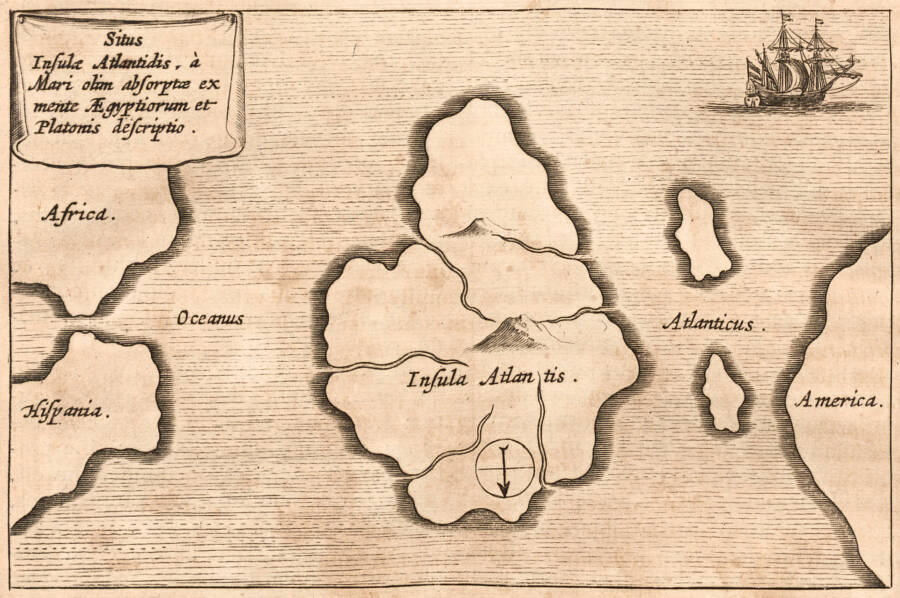
Public DomainAthanasius Kircher’s map, created circa 1669, shows the lost city in the middle of the Atlantic Ocean. In this map, the south is oriented at the top.
There are many purported “lost cities” throughout time, but none are more famous than Atlantis. First described by the Greek philosopher Plato, Atlantis served as an allegorical representation of the hubris of large nations — and the consequences that come as a result.
Plato wrote that Atlantis had once been a powerful naval empire, dominating much of the Western world before it fell out of favor with the gods and submerged in the Atlantic Ocean.
Although many historians agree that Plato’s descriptions of Atlantis were purely fictitious — meant only to illustrate the larger point in his works Critias and Timaeus — this hasn’t stopped speculation, conspiracy theories, and legends about the lost city from circulating.
Even today, many people wonder: did Atlantis really exist? Here’s what history tells us.
Plato’s Atlantis Was A Very Different Place
While modern stories of Atlantis often depict it as some lost utopian society, the version of Atlantis in Plato’s dialogues was anything but.
Plato first told the story of the lost city in Timaeus and Critias, which serve, still, as the foundation of all other legends surrounding this purported ancient Empire.
In his dialogues, Plato quotes an Athenian named Solon — one of the Seven Sages of Greece — who had spent time in Egypt between 590 and 580 B.C.E., claiming that he first heard of Atlantis during his travels. Solon, according to Plato, found Egyptian records that spoke of Atlantis, which he then translated.

Everett Collection Inc / Alamy Stock PhotoSolon (630-560 B.C.E.) was an Athenian poet and statesman who rallied against the “moral decline” of Athens.
In Timaeus, Plato described Atlantis as having once been “larger than Libya and Asia together; and it was possible for the travelers of that time to cross from it to the other islands, and from the islands to the whole of the continent over against them which encompasses that veritable ocean.”
Plato also describes the civilization’s leadership as “a confederation of kings, of great and marvelous power, which held sway over all the island.”
This latter detail is of particular note, as it represents a society quite different than the ancient democracy of Athens. In Critias, Plato further expands upon the story of Atlantis, postulating that ancient Athens represented the “perfect society” which he detailed in Republic — and that Atlantis stood in direct contrast.
He further explained that the island nation had been bequeathed to Poseidon, who then fell in love with a woman named Cleito. The two had five pairs of male twins together, the oldest of whom was named Atlas. In Plato’s tale, the Atlantic Ocean was said to be named for him, and Atlas became the king of Atlantis.

Science History Images / Alamy Stock PhotoThe ancient Greek philosopher Plato first wrote about Atlantis in 360 B.C.E.
Eventually, the kingdom grew and began to expand, and a war broke out between the Atlanteans and the Athenians. Atlantis had already overthrown parts of Libya, the European continent, and lands as far as Egypt, but the Athenians led a successful resistance and liberated the conquered lands.
In the wake of this conflict, Plato wrote, “there occurred violent earthquakes and floods; and in a single day and night of misfortune,” Atlantis “disappeared in the depths of the sea.”
All of this purportedly happened 9,000 years before Plato’s own time.
Many historians agree that Plato conceived of the story to function as a cautionary tale, largely due to the fact that other writings from the time failed to mention the lost city. But then, nearly 2,000 years after Plato first wrote of Atlantis, new life was breathed into the legend.
Ignatius Donnelly Reignites Theories About The Lost City
In 1882, former U.S. Congressman Ignatius L. Donnelly published a book titled Atlantis: The Antediluvian World. Donnelly claimed that Atlantis had indeed existed, but unlike Plato’s portrayal, it had been a place “where early mankind dwelt for ages in peace and happiness.”
Donnelly outlined 13 hypotheses about Atlantis that he sought to examine, including that Plato’s description of Atlantis was true, that Atlantis was the first real human civilization, that the Greek pantheon of gods had actually been the kings and queens of the island nation, that Atlanteans practiced Sun worship, and that Indo-Europeans, the Semitic peoples, and the Turanian races all stemmed from Atlantis.
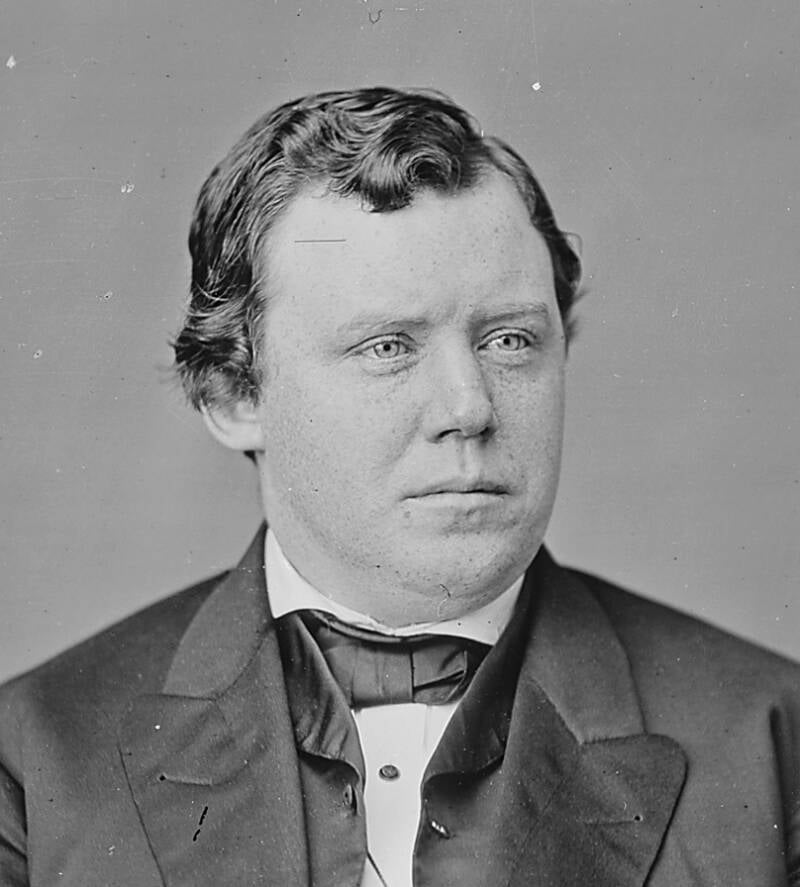
Public DomainIgnatius Donnelly’s theories on Atlantis established the framework for all that would follow.
“The fact that the story of Atlantis was for thousands of years regarded as a fable proves nothing,” Donnelly wrote. “There is an unbelief which grows out of ignorance, as well as a skepticism which is born of intelligence. The people nearest to the past are not always those who are best informed concerning the past.”
He likened the potential discovery of Atlantis to Pompeii and Herculaneum, which were once considered myths and referred to as “fabulous cities.” And, in fact, just 10 years before Donnelly’s Atlantis was published, two amateur archaeologists named Heinrich Schliemann and Frank Calvert claimed to have found the ancient city of Troy first described in Homer’s Iliad.
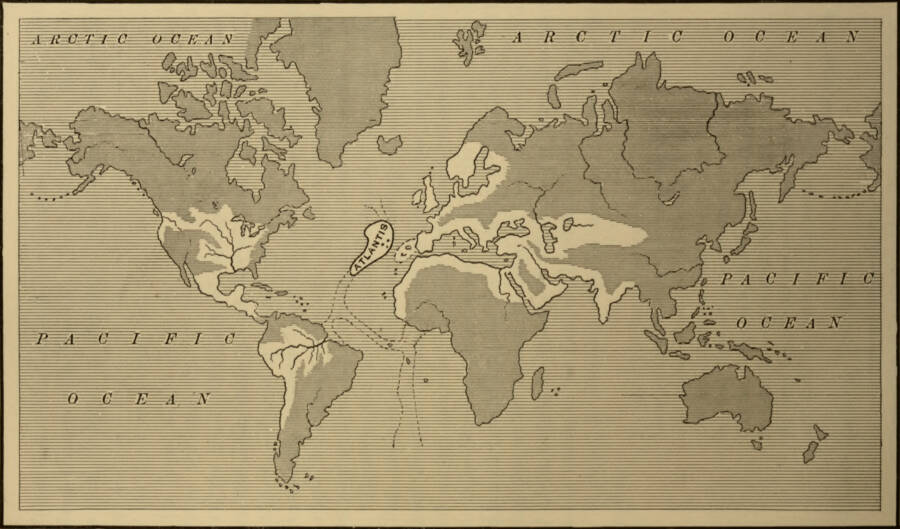
Public DomainA map outlining the purported reach of the Atlantean Empire.
While Donnelly did not find any true evidence supporting his hypotheses, his work proved to be massively influential. Many theories on Atlantis stem from Donnelly’s own ideas, and his work inspired other authors like James Churchward, who wrote of the lost continent of Mu, sometimes called Lemuria.
The discovery of other sunken cities across the world in the years since Donnelly’s book was published have also kept the hope of one day finding Atlantis alive — and some archaeological evidence may, in fact, support this.
Credible Evidence That The Fabled Island Nation Once Existed
Several discoveries over the centuries have been linked to Atlantis, such as Bimini Road, an underwater rock formation off the coast of North Bimini, which some have taken to calling the “road to Atlantis.”
That said, there is little conclusive evidence to suggest the limestone blocks that make up Bimini Road are anything but natural, and in the decades since this discovery was made, nothing else has linked it to the actual city of Atlantis.
Other theories have connected the story of Atlantis to the island of Santorini, but according to author Christos A. Djonis, this theory falls apart, as it completely disregards Plato’s given chronology of 9600 B.C.E.
Writing for the Greek Reporter, Djonis instead suggests that the tale of Atlantis may have been tied to the Cyclades Islands, which were “once connected by a vast plateau now 400 feet underwater (the Cyclades Plateau) and the Cyclades, as we know them today, were mountaintops of the prehistoric super-island.”
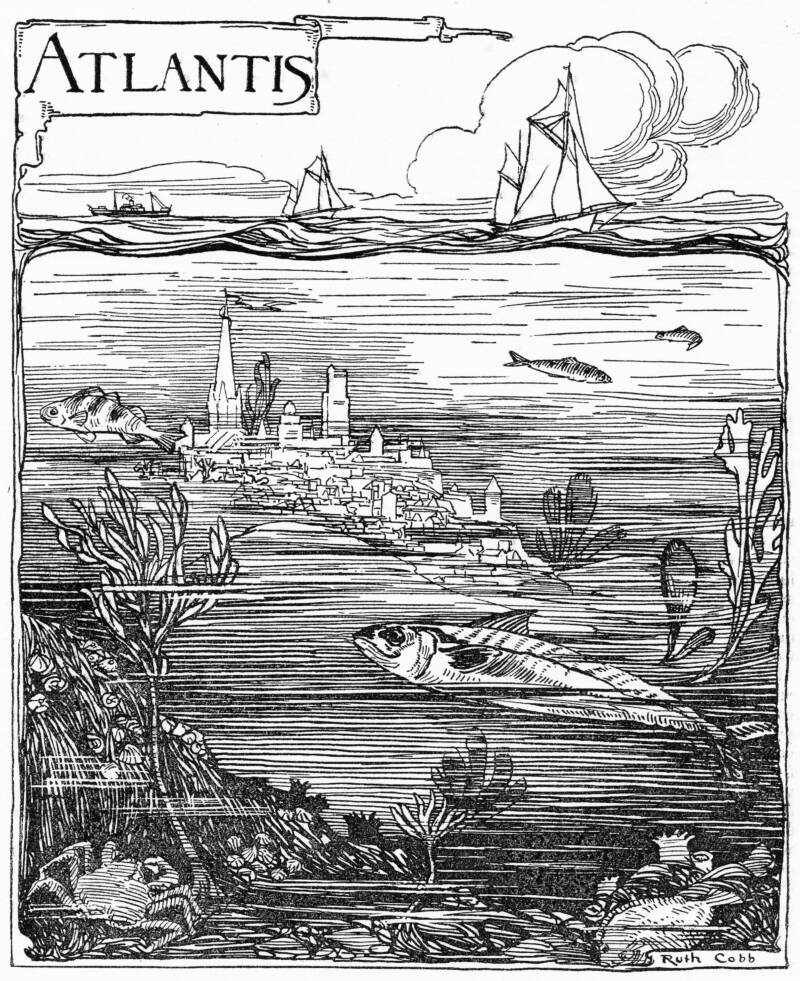
Lakeview Images / Alamy Stock PhotoAtlantis in its watery grave, from a 1925 issue of Chatterbox magazine.
Oceanographic studies have shown that oceans and the Mediterranean Sea were lower by about 400 feet in the ancient world, meaning, according to Djonis, that if Atlantis had been real, it would now be under 400 feet of water. Based on this, the Cyclades Islands theory could actually be a reasonable one.
Rather than “sinking” into the ocean, as Plato had suggested, Djonis argues that the rising of the sea level could have been the “flood” that claimed Atlantis.
“As for the occupants of that prehistoric island, recent DNA studies by the University of Washington and others concluded that after the sea level in the Mediterranean began to rise, to escape the inundation, some of those people migrated as far as the island of Crete,” Djonis writes. They eventually established themselves as the Minoan civilization, while other former Atlanteans reemerged as the Myceneans and the Aegeans.
This is, of course, a distilled version of Djonis’ theory, which he covers in more depth in his book Atlantis: The Find of a Lifetime.
Still, despite Djonis’ thorough research, conclusive evidence of Atlantis has yet to be discovered.
So, Is Atlantis Real?
Ultimately, while fantastical stories of Atlantis have been told for centuries, it seems more and more implausible that there ever was a real Atlantis — at least, not one as Plato described.
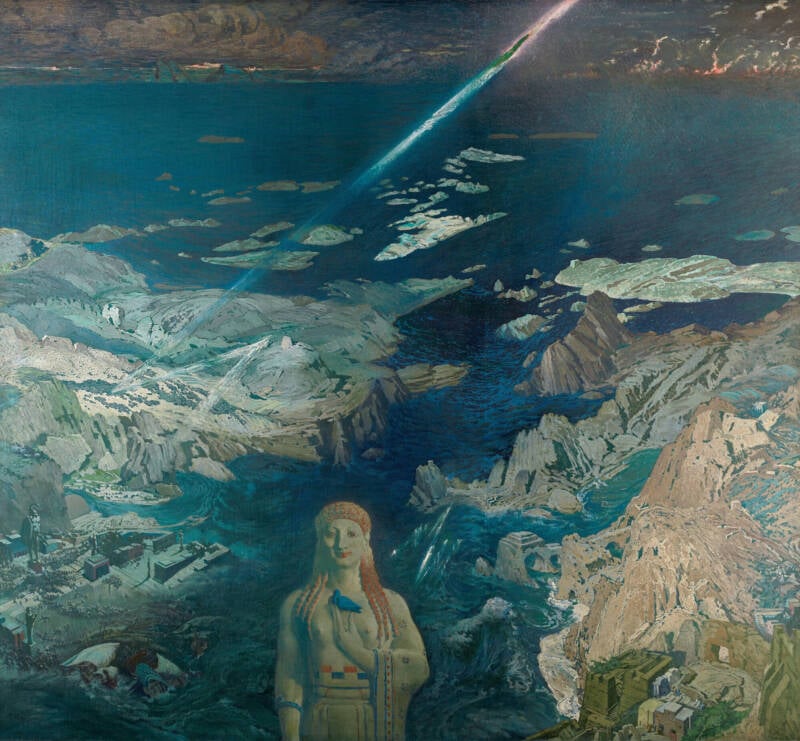
Public DomainArtist Léon Bakst’s portrayal of Atlantis.
Theories like Djonis’ make a compelling case but still fail to take all factors into consideration. For example, even if there had once been a kingdom known as Atlantis, the likelihood that it was “larger than Libya and Asia together” is all but impossible, based on what researchers know about tectonic plates — not to mention that a landmass of that size in the middle of the Atlantic would surely have been noticed by oceanographers.
But sunken cities have been found before, so it’s also worth considering that Plato’s account might have been somewhat embellished. He does make it clear, however, that Atlantis was in the Atlantic Ocean, and to date, it has never been found.
Plus, there are the many theories not covered here — that Atlantis was some hyper-advanced civilization far beyond its years, that it never sank but is instead one of any number of modern islands, or that it disappeared into the Bermuda Triangle — that muddy the waters even further.
As it stands, it’s safe to say there is no evidence that Atlantis is real — and science would agree.
After diving into the story of Atlantis, learn about Neopolis, the Atlantis-like city found off the Tunisian coast. Or, read about mythical creatures zoologists once believed were real.





